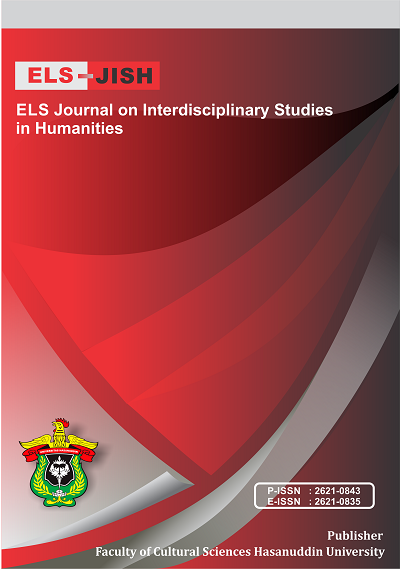The Influence of Motivation and Learning Style on Learning Pattern Toward Students’ Speaking Improvement
DOI:
https://doi.org/10.34050/elsjish.v6i1.24949Keywords:
Influence, Learning Style, Learning Pattern, Motivation, Speaking SkillAbstract
In learning, there are three interrelated dimensions to support the learning, namely the cognitive, affective, and psychomotor dimensions. From these learning dimensions, there are learning styles that are included in the cognitive dimension and motivation are included in the affective dimension of learning. This study aims to find out the relationship and influence of motivation and learning style on learning pattern toward speaking improvement of UMPAR English Education students. The researcher applies a qualitative method with a case study approach based on phenomena among students. The respondents in this study consisted of three third-semester students and three fifth-semester students from the English education department UMPAR. In addition, this study conducted semi-structured interviews with students to understand deeper perceptions. The results of the interviews show that there are various student motivations in improving their speaking skills, namely: to train self-confidence, a sense of competition, to develop more, to gain appreciation, presence of a role model, and the support of other people. Apart from motivation, researchers found a learning style that plays a very important role in student learning, namely the auditory learning style with the highest score in all the VARK learning style test results for respondents. The researcher found that there were four classifications of student learning patterns in improving speaking skills, namely: Experience of applying learning media, social interaction, word notice, monologue habits. The results of the research about the influence of motivation and learning styles on learning patterns toward students’ speaking improvement show that there is a positive influence of motivation and learning styles on student learning patterns in improving speaking skills
References
Andini, C., Sosrohadi, S., Fairuz, F., Dalyan, M., Rahman, F. F., & Hasnia, H. (2022). The Study of Japanese Women in the Facial Treatment Advertisement: A Semiotics Perspective of Pierce’s Theory. ELS Journal on Interdisciplinary Studies in Humanities, 5(2), 337-347.
Anggawira, A.M., Prihandoko, L.A., & Rahman, F. (2021). Teacher’s Role on Teaching English During Pandemic in a Blended Classroom. International Joined Conference on Social Science (ICSS 2021).
Costa, R. D., Souza, G. F., Valentim, R. A., & Castro, T. B. (2020). The theory of learning styles applied to distance learning. Cognitive Systems Research, 64, 134-145.
Ha, N. T. T. (2021). Effects of learning style on students achievement. Linguistics and Culture Review, 5(S3), 329–339. https://doi.org/10.21744/lingcure.v5ns3.1515
Hamuddin, B., Rahman, F., Pammu, A., Baso, Y. S., & Derin, T. (2023). Mitigating the effects of cyberbullying crime: A multi-faceted solution across disciplines. International Journal of Innovative Research and Scientific Studies, 6(1), 28-37.
Hasnia, H., Andini, C., Tahir, M. D., Hunaeni, H., Zulfikariandi, Z., & Muslimin, M. T. (2022). The Ability of 1st Class Students of SMAN 11 Enrekang to Arrange Verbal and Nominal Sentences. ELS Journal on Interdisciplinary Studies in Humanities, 5(3), 539-550.
Hoque, M. E. (2016). Three Domains of Learning: Cognitive, Affective and Psychomotor. The Journal of EFL Education and Research, 2(February), 2520–5897.
Isemonger, I., & Sheppard, C. (2003). Learning styles. RELC Journal, 34(2), 195-222.
Kusuma, I. P. I., & Adnyani, L. D. S. (2016). MOTIVASI DAN SIKAP BAHASA MAHASISWA JURUSAN PENDIDIKAN BAHASA INGGRIS UNDIKSHA. JPI (Jurnal Pendidikan Indonesia), 5(1), 12. https://doi.org/10.23887/jpi-undiksha.v5i1.8290
Meşe, E., & Çiğdem, S. (2021). Factors influencing EFL students’ motivation in online learning: A qualitative case study. Journal of Educational Technology & Online Learning, 4(1), 11–22. https://dergipark.org.tr/en/pub/jetol/issue/60134/817680
Moussa, N. (2014). The importance of learning styles in education. Institute for Learning Styles Journal, 1(2), 19-27.
Prihandoko, L. A., Al Ahmad, A. S. M., & Rahman, F. (2022). Revitalizing Hospitality, Managerial, and English for Tourism Purposes Skills: Community Partnership Program for Hotel Employees in Merauke Regency. ABDIMAS: Jurnal Pengabdian Masyarakat, 5(2), 2524-2531.
Rahman, F., Abbas, H., Akhmar, A. M., & Tahir, M. D. (2023). The Men and the Sea: Cultural Preservation of Bajau People with their Traditional Practice in Bone Regency. Journal of Positive Psychology and Wellbeing, 7(1), 820-835.
Rahman, F., & Weda, S. (2018). Students’ perceptions in appreciating English literary works through critical comment: A case study at Hasanuddin University and Universitas Negeri Makassar. Asian EFL Journal, 20(3), 149-172.
Scott, C. (2010). The enduring appeal of ‘learning styles’. Australian journal of education, 54(1), 5-17.
Shah, K., Ahmed, J., Shenoy, N., & N, S. (2013). How different are students and their learning styles? International Journal of Research in Medical Sciences, 1(3), 1. https://doi.org/10.5455/2320-6012.ijrms20130808
Sukmawaty, Rahman, F. F. & Andini, C. (2022). Covid-19 Pandemic and Axiology of Communication: A Study of Linguistic Phenomena.IJISRT, 7(4), 1079-1087.
Vermunt, J. D., & Donche, V. (2017). A Learning Patterns Perspective on Student Learning in Higher Education: State of the Art and Moving Forward. In Educational Psychology Review, 29(2), 269–299). Educational Psychology Review. https://doi.org/10.1007/s10648-017-9414-6.
Yassi, A. H., Sahib, H., Ramadhani, R., & Aswad, M. (2022). The Language Attitudes of the Community Members Towards Their Local Language, Konjonese of Bulukumba, Indonesia. In 2nd International Conference on Social Science, Humanities, Education and Society Development (ICONS 2021) (pp. 14-27). Atlantis Press.
Downloads
Published
Issue
Section
License
Copyright (c) 2023 Khadijah Maming, Ali Wira Rahman, Radiah Azizah Idris

This work is licensed under a Creative Commons Attribution-ShareAlike 4.0 International License.






